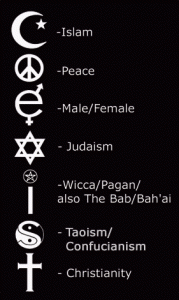The key finding of the Pew Forum’s recent U.S. Religious Landscape Survey was this:
More than one-quarter of American adults (28%) have left the faith in which they were raised in favor of another religion – or no religion at all.
 So nearly 1/3 of American adults (that according to the survey of 35,000 18-and-overs) have left the religion of their youth. While interpretations vary regarding these findings — from the apparent decline of Christian cultural influence to the waning of institutional commitments among the next generation — most agree the survey is indicative of a fairly significant change in America’s religious landscape.
So nearly 1/3 of American adults (that according to the survey of 35,000 18-and-overs) have left the religion of their youth. While interpretations vary regarding these findings — from the apparent decline of Christian cultural influence to the waning of institutional commitments among the next generation — most agree the survey is indicative of a fairly significant change in America’s religious landscape.
Certainly, changing religions is not that unusual. It’s the degree to which Americans –once clearly monotheistic and Judeo-Christianized — have eschewed their roots for other spiritual pastures, that is alarming.
The report notes that “religious affiliation in the U.S. is both very diverse and extremely fluid.” Diverse and fluid. That’s our religious climate. But are our religious affiliations more fluid because our beliefs are more diverse (i.e., we change religions because there’s more options), or are our beliefs more diverse because our spiritual outlook is more fluid (i.e., we are philosophically / theologically untethered and are more free to tinker with religious views)?
I am firmly of this latter persuasion.
Of course, there could be many factors behind our “philosophical /  theological fluidity.” You could argue that people leave the religion of their youth because their parents have not done a good job instilling that religion in their kids. Or perhaps the religion those parents are seeking to instill is inherently flawed or defective. In these cases, maybe it’s appropriate for someone to, at least, reevaluate their spiritual roots. But there’s a larger issue at work here, one that I think eclipses those factors.
theological fluidity.” You could argue that people leave the religion of their youth because their parents have not done a good job instilling that religion in their kids. Or perhaps the religion those parents are seeking to instill is inherently flawed or defective. In these cases, maybe it’s appropriate for someone to, at least, reevaluate their spiritual roots. But there’s a larger issue at work here, one that I think eclipses those factors.
This is the first generation that’s grown-up in a thoroughly postmodern American culture. The philosophical engine that drives postmodernism is relativism — the belief that truth is not absolute. Relativism undermines most traditional religious beliefs because it makes the individual the primary arbiter of truth, not a holy man, holy book, or church. Thus, what I feel is true or believe is true, is true for me. If the principles of Buddhism appeal to me more than the principles of Christianity, well then, that’s my truth. In postmodern America, there is no objective way to corroborate faith other than personal preference, which in this case, has actually become our religion.
Is it any coincidence that the more postmodern we become, the more fluid becomes our religious beliefs and affiliations? I don’t think so. However, if we continue along this path, religious beliefs and affiliations will become trivial and, ultimately, expendable.














Postmodernist thinking is pernicious, rampant and annoying, but isn't necessarily a new development. The devil gave rise to it at the Tree of Knowledge. It showed up in society whenever people started organizing idolatry, based on the relativist notion that "god" was "whatever seems to work right now."
Even in the U.S., the Great Awakening of the 1730s came in the wake of a colonial society wracked with political confusion, frontier licentiousness, and, most importantly, the intentional smothering of faith by the Enlightenment.
The Second and Third Awakenings also arrived on a country whose citizens had "fallen asleep" on faith in Jesus. Postmodernism, with all its chaos, relativity, multi-mashing and deconstruction is just a fancy name for being sound asleep in sin. Those few "postmodern thinkers" who truly are intellectually rigorous and open-minded can be and should be engaged in post-modern terms, because the light of God will break into it.
perhaps religious beliefs and affiliations are expendable because they are trivial … and when all the fluff boils out, the salt that's left at the bottom will be the real stuff, the seed, through which God can begin to reach people again.
I think perhaps the statistical base is skewed. As XDPaul suggested, this line of thinking isn't new, just more visible with the enhanced media access to everyone with a voice. I suspect that at least a portion of this 28% never had a real and specific faith in anything except a random agnoticism which they labeled their religion of choice. Now they can be hip and fashionable by labeling themselves outside the supposed "right wing" and declare they have found more value in declaring their redefined mode of spirituality.
However, I would agree that the strongly left-minded media has caused this generation to be raised up with a negative view of Christianity, not that they've accurately portrayed any part of it, but, nevertheless, by pointing out what they consider its "flaws" and by focusing on the blatant failures of visible members, they've somewhat succeeded in rocking the proverbial spiritual boat of those who have no real source and reality of who Jesus is to go on.
I , too, left the religion of my youth. I was raised a Missouri Synod Lutheran, and am now an Evangelical Presbyterian. Would this count in the Pew study?